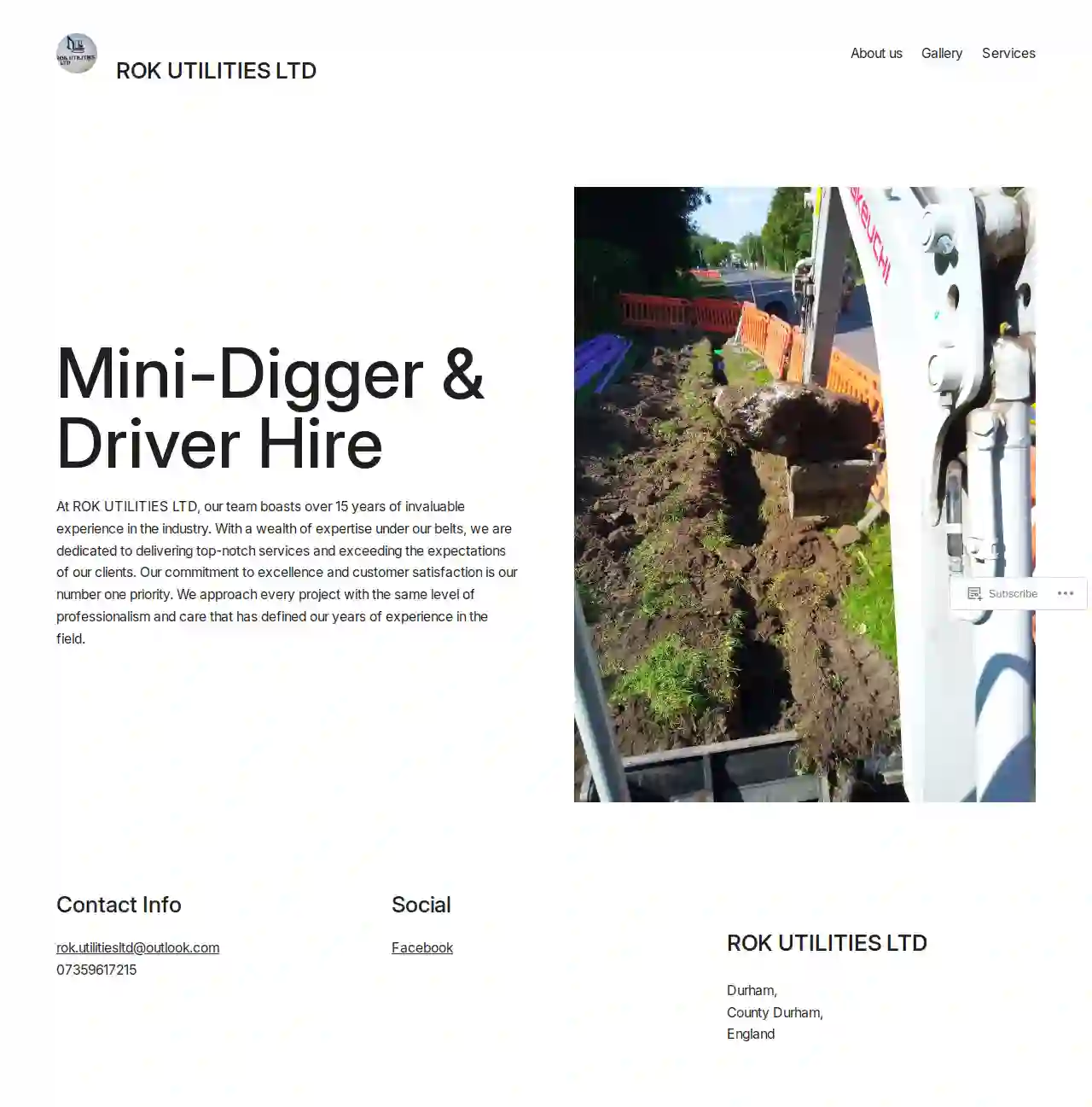Excavation Contractors Burnopfield
Find Excavation Contractor in Burnopfield
Get up to 3 Excavation Contractors quotes for your project today! Compare profiles, reviews, accreditations, portfolio, etc... and choose the best service.

Rok utilities ltd
51 reviewsDurham, County Durham, GBAbout ROK UTILITIES LTD At ROK UTILITIES LTD, our team boasts over 15 years of invaluable experience in the industry. With a wealth of expertise under our belts, we are dedicated to delivering top-notch services and exceeding the expectations of our clients. Our commitment to excellence and customer satisfaction is our number one priority. We approach every project with the same level of professionalism and care that has defined our years of experience in the field.
- Services
- Why Us?
- Gallery
Get Quote
JW Plant Hire & Excavation
54 reviewsDurham, GBJW Plant Hire & Excavation We are a reliable and hardworking family run business, located in County Durham. Providing excavation services and micro plant machinery hire, in and around the North East of England. I'm committed to providing a high standard of service. No matter the size of the job, I guide my clients every step of the way and offer highly competitive rates. Take a look at my services below and call me today to schedule an initial consultation.
- Services
- Why Us?
- Gallery
Get Quote
Brambledown Landscape Services Ltd
12 reviewsDurham, GBWelcome To Brambledown Brambledown Landscape Services Ltd have 50 years experience in providing Award winning commercial Landscape Environmental Improvement schemes across the UK. Our specialist Landscape work has vastly improved numerous public spaces, particularly Historic Parks, Community gardens, National Parks, Botanical Gardens and Town Parks. Recognising the time and money spent invested in these projects, Brambledown Landscapes have ensured that every Environmental Improvement scheme that we are involved in, meets our strict high level quality procedures in line with Achilles Building Confidence Level 4 Status, ISO 9001, Constructionline Gold & CHAS.
- Services
- Why Us?
- Gallery
Get Quote
GROUNDWORKS DIRECT LTD
2.712 reviewsDurham, GBWhat is Plesk? Plesk is a hosting panel with simple and secure web server, website and web apps management tools. It is specially designed to help web professionals manage web, DNS, mail and other services through a comprehensive and user-friendly GUI. Plesk is about intelligently managing servers, apps, websites and hosting businesses, on both traditional and cloud hosting.
- Services
- Why Us?
Get Quote
G M H Mini Plant Hire & Groundworks
High Hillside Farm, Houghton Le Spring, DH5 8BG, GBWelcome to G M H Mini Plant Hire & Groundworks, a trusted family-run business with a proud 9-year legacy. Serving Newcastle, Houghton Le Spring and beyond, we have earned an excellent reputation for plant hire and groundworks excellence. At G M H Mini Plant Hire & Groundworks, we provide professional and swift service, always maintaining the highest quality standards. Our communication with customers is exceptional, ensuring a smooth experience from beginning to end. A guarantee of superior work backs each project we undertake. Our business thrives on customer satisfaction and positive referrals. With a history of inventive designs, effective problem-solving, and attention to detail, we aim to meet and surpass the expectations of every customer. From minor domestic tasks to extensive commercial projects, we handle each job with precision and care. We are also proud members of the Construction Plant-Hire Association and hold certifications like the First Aid Awards Ltd Emergency First Aid at Work Level 2 Award and the Construction Skills Certification Scheme.
- Services
- Why Us?
- Accreditations
- Testimonials
- Gallery
Get Quote
Herrington Landscapes Ltd
522 reviewsDurham, GBHERRINGTON LANDSCAPES Bespoke garden design & installation With over 14 years of experience Herrington Landscapes can work with you to create a bespoke garden design & installation. Let us take care of your dream garden.
- Services
- Why Us?
- Testimonials
- Gallery
Get Quote
H. E. Services (Plant Hire) Ltd
53 reviewsDurham, GB- Services
- Why Us?
Get Quote- Wi
Wilf Husband
4.68 reviewsDurham, GB- Services
- Why Us?
Get Quote - Bi
Bishop Middleham Quarry
4.766 reviewsDurham, GB- Services
- Why Us?
Get Quote - Le
Les Brown Excavating Ltd.
55 reviewsDurham, GB- Services
- Why Us?
Get Quote
Over 13,059+ Excavation Businesses on our platform
Our excavation contractors operate in Burnopfield and surroundings!
ExcavationHQ has curated and vetted the Best Excavation Companies near Burnopfield. Find a trustworthy business today.
Frequently Asked Questions About Excavation Contractors
- Hauling to Designated Disposal Sites: Transporting excavated material to approved landfills or recycling centers.
- Recycling or Reuse: If suitable, some excavated soil might be recycled for other projects or reused on-site for landscaping or backfilling.
- Complying with Regulations: Adhering to local and environmental regulations for soil disposal to prevent contamination or illegal dumping.
- New Construction: Laying foundations, basements, or underground utilities for new buildings.
- Home Additions: Creating space for new rooms, basements, or extensions.
- Landscaping: Leveling ground, creating slopes, installing retaining walls, or digging for ponds or pools.
- Drainage Improvement: Installing French drains, drainage ditches, or swales to manage water runoff.
- Utility Installation or Repair: Laying new water, sewer, gas, or electrical lines, or repairing existing ones.
- Demolition: Clearing debris and preparing the site after demolishing a structure.
- Soil Type and Stability: Stable, cohesive soils allow for deeper excavations than loose or unstable soils.
- Groundwater Level: Excavations below the water table require dewatering techniques to manage water intrusion.
- Equipment and Resources: The size and capabilities of excavation equipment influence the achievable depth.
- Safety Regulations: OSHA and other safety regulations impose limitations on trench depths without proper shoring or sloping.
- Project Requirements: The purpose of the excavation (basement, pool, foundation) determines the necessary depth.
- Planning and Surveying: Defining the excavation area, marking utility lines, and determining the required depth and grade.
- Site Preparation: Clearing vegetation, removing obstacles, and ensuring site accessibility.
- Excavation: Using appropriate equipment (excavators, backhoes, etc.) to remove earth and create the desired excavation.
- Hauling and Disposal: Transporting excavated material to designated disposal sites, complying with environmental regulations.
- Backfilling and Compaction: Refilling the excavation with suitable material and compacting it to achieve the required density and stability.
- Grading and Finishing: Leveling and shaping the surface to the final grade for landscaping or construction.
How do you handle soil disposal after excavation?
How do I know if I need excavation for my project?
How deep can you excavate?
What is the excavation process?
How do you handle soil disposal after excavation?
- Hauling to Designated Disposal Sites: Transporting excavated material to approved landfills or recycling centers.
- Recycling or Reuse: If suitable, some excavated soil might be recycled for other projects or reused on-site for landscaping or backfilling.
- Complying with Regulations: Adhering to local and environmental regulations for soil disposal to prevent contamination or illegal dumping.
How do I know if I need excavation for my project?
- New Construction: Laying foundations, basements, or underground utilities for new buildings.
- Home Additions: Creating space for new rooms, basements, or extensions.
- Landscaping: Leveling ground, creating slopes, installing retaining walls, or digging for ponds or pools.
- Drainage Improvement: Installing French drains, drainage ditches, or swales to manage water runoff.
- Utility Installation or Repair: Laying new water, sewer, gas, or electrical lines, or repairing existing ones.
- Demolition: Clearing debris and preparing the site after demolishing a structure.
How deep can you excavate?
- Soil Type and Stability: Stable, cohesive soils allow for deeper excavations than loose or unstable soils.
- Groundwater Level: Excavations below the water table require dewatering techniques to manage water intrusion.
- Equipment and Resources: The size and capabilities of excavation equipment influence the achievable depth.
- Safety Regulations: OSHA and other safety regulations impose limitations on trench depths without proper shoring or sloping.
- Project Requirements: The purpose of the excavation (basement, pool, foundation) determines the necessary depth.
What is the excavation process?
- Planning and Surveying: Defining the excavation area, marking utility lines, and determining the required depth and grade.
- Site Preparation: Clearing vegetation, removing obstacles, and ensuring site accessibility.
- Excavation: Using appropriate equipment (excavators, backhoes, etc.) to remove earth and create the desired excavation.
- Hauling and Disposal: Transporting excavated material to designated disposal sites, complying with environmental regulations.
- Backfilling and Compaction: Refilling the excavation with suitable material and compacting it to achieve the required density and stability.
- Grading and Finishing: Leveling and shaping the surface to the final grade for landscaping or construction.